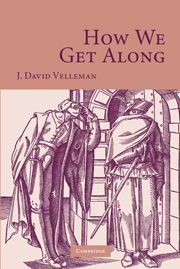3 - Interacting
Published online by Cambridge University Press: 05 July 2015
Summary
What difference does it make in my attitude toward you, or what difference should it make, that I recognize you as a rational agent? Our answer to this question will depend on our conception of rational agency. According to the decision-theoretic conception, the recognition of your rational agency should lead me to do what would maximize my expected utility in light of what I expect you to do to maximize your expected utility in light of what you expect me to do. According to Kant, the recognition of your rational agency should lead me to respect you, by treating you never merely as a means but always also as an end in itself.
The question presupposes that I too am a rational agent. It asks not just how I should regard you upon recognizing you as a rational agent but how I as one rational agent should regard you upon recognizing you as another. According to my conception of rational agency, the answer is that I should regard you as a fellow self-enacting improviser. What would follow from regarding you in that way?
In recognizing you as a fellow self-enacter, I recognize that we share a perspective on one another's behavior. If I am to deal with you successfully, I need to understand your behavior, which is best understood in terms of your wants, plans, values, habits, emotions, traits of personality, and so on.
- Type
- Chapter
- Information
- How We Get Along , pp. 59 - 88Publisher: Cambridge University PressPrint publication year: 2009



